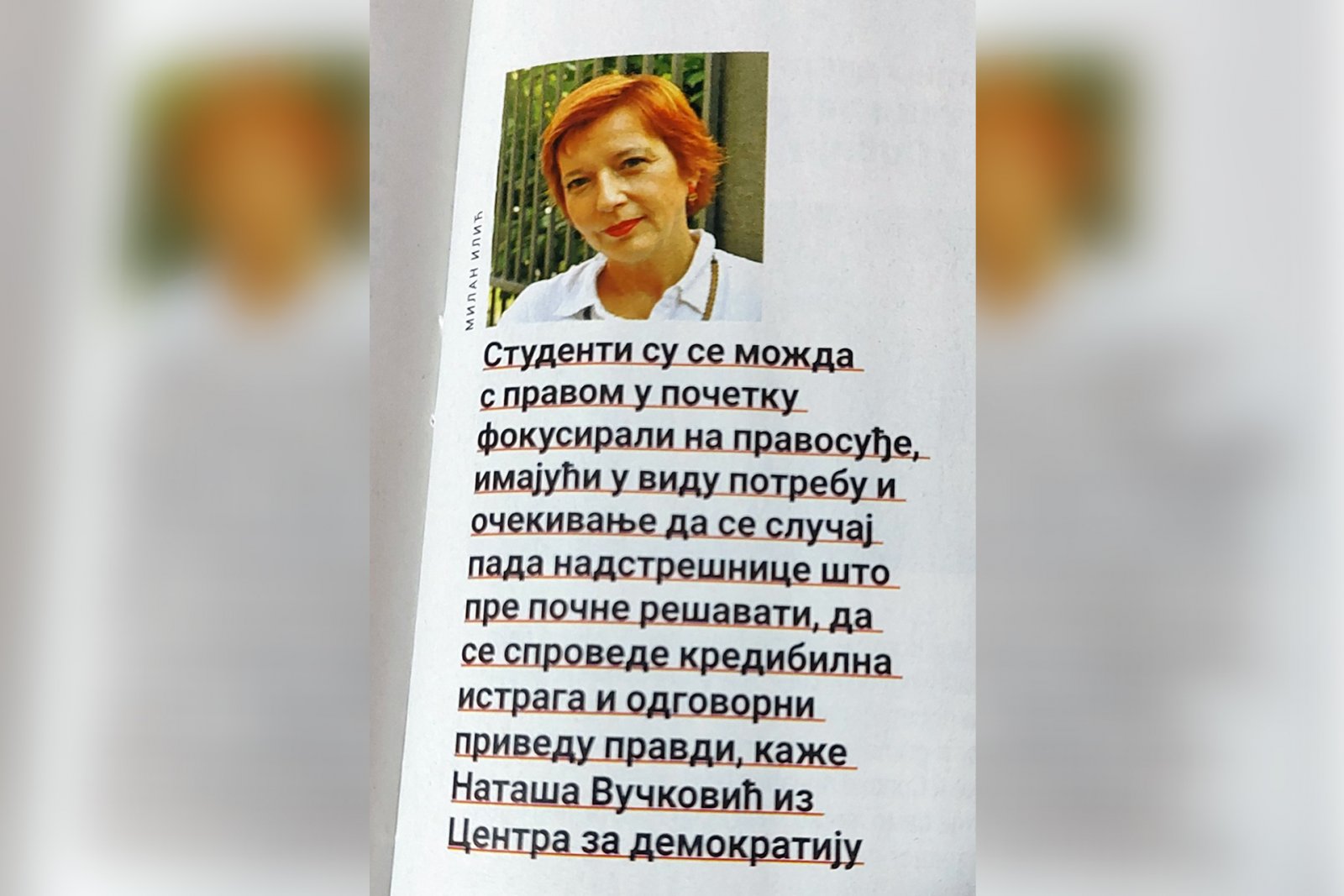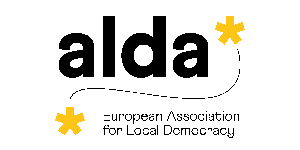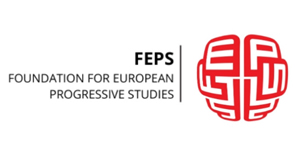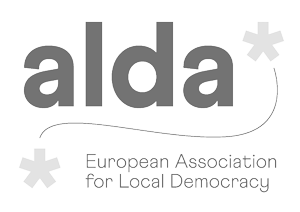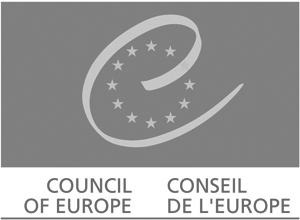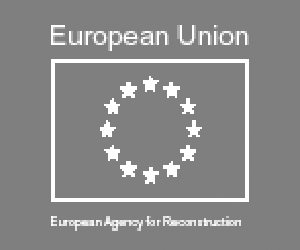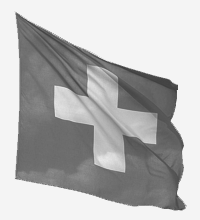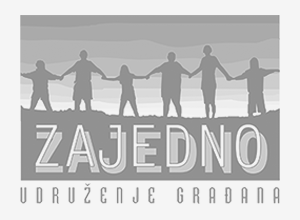Student and Civic Protests Have Shown That Serbian Citizens Share European Values of Democracy and Rule of Law
Nataša Vučković for NIN
"Student and civic protests have shown that the citizens of Serbia share European values of democracy and the rule of law, and that the principles of separation of powers, accountable government, and good governance are well rooted in Serbian society. I consider this a very important argument in any discussion about our citizens' interest in Serbia’s European future", stated Nataša Vučković, Secretary General of the Center for Democracy Foundation, in an interview with NIN.
In a conversation on the topic of young people's trust in institutions, Vučković emphasized that students rightly focused the most on the judiciary.
"The student protest began with a call for institutions, primarily the prosecution and judiciary, to do their job in accordance with their competences, free from unlawful outside influence, especially from the executive branch. In doing so, they pointed to one of Serbia’s fundamental problems - dormant or 'captured' institutions and individuals within them, selective application of the law, the existence of protected groups and individuals, and the nexus between parts of the government and economic power centers - and they sparked a wave of civic dissatisfaction that resonates with the experiences of many who have encountered some form of injustice while trying to exercise their rights, whether to claim what they are legally entitled to or to defend themselves from violations of their rights."
"Each of us knows plenty of people who, in the past ten years, have experienced some form of injustice at the hands of government officials, the ruling party, or local power brokers. This gives rise to a demand for justice, which students have placed at the center of their narrative on the need to reform institutions. After all, this is also a kind of response to the diagnosis of a 'captured state' that has appeared for several years now in various analyses by both European and domestic analysts", says Vučković, and adds:
"Student and civic protests have shown that Serbian citizens share European values of democracy and the rule of law, and that the principles of separation of powers, accountable government, and good governance are well rooted in Serbian society. I consider this a very important argument in any discussion about our citizens' interest in Serbia’s European future. Students may have rightly focused on the judiciary at the outset, considering the need and expectation that the case of the collapsed canopy be addressed as soon as possible, that a credible investigation be conducted, and that those responsible be brought to justice".
Nataša Vučković points out that the relationship between institutions is largely shaped by the balance of political power, making it necessary for other institutions, particularly the parliament, to also be in focus. As she explains, the National Assembly is the place where the sovereignty of citizens is expressed, from which all other branches of government derive, directly or indirectly, where laws are adopted and public spending is planned, and where transparent oversight of all government activities should take place, especially oversight of state spending.
"This oversight function can and must be effectively performed by the opposition. Instead of distancing themselves from the progressive and pro-European opposition, student and civic protests cannot help but see an ally in the opposition. After all, it was opposition activists in smaller towns who helped organize local civic gatherings. The demand for political articulation of student and civic protests means setting political demands, creating a political platform, building partnerships and coalitions, uniting and agreeing on joint actions in preparation for and participation in, above all, parliamentary elections. A political platform should point the way to institutional reform, but also address political issues that have long been on our political agenda", Vučković concludes.
Source: NIN
PUBLICATIONS
 Manual “The Path to Employment: Get to Know Your Rights and Opportunities”
Manual “The Path to Employment: Get to Know Your Rights and Opportunities”
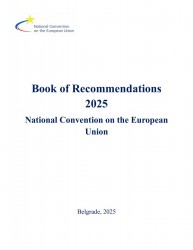 NCEU Book of Recommendations 2025
NCEU Book of Recommendations 2025
 Challenges for Organising and Collective Bargaining in Care, Administration and Waste collection sectors in Central Eastern European Countries
Challenges for Organising and Collective Bargaining in Care, Administration and Waste collection sectors in Central Eastern European Countries
 Public Policy Proposals – Collective Bargaining (CEECAW)
Public Policy Proposals – Collective Bargaining (CEECAW)
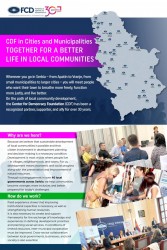 CDF in Cities and Municipalities: Together for a Better Life in Local Communities
CDF in Cities and Municipalities: Together for a Better Life in Local Communities
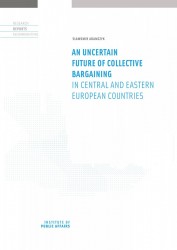 Comparative reports on collective bargaining - CEECAW
Comparative reports on collective bargaining - CEECAW
 POLITEIA – Regional School for Youth Participation 2025 (leaflet)
POLITEIA – Regional School for Youth Participation 2025 (leaflet)
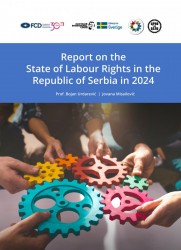 Report on the State of Labour Rights in the Republic of Serbia in 2024
Report on the State of Labour Rights in the Republic of Serbia in 2024
 Unlocking Collective Bargaining Power in Three Sectors: A Call to Action
Unlocking Collective Bargaining Power in Three Sectors: A Call to Action
 Main Issues of Labor Legislation in Serbia
Main Issues of Labor Legislation in Serbia
 New Monitoring Report by the “SDGs for All” Platform: Is the End Goal in Sight?
New Monitoring Report by the “SDGs for All” Platform: Is the End Goal in Sight?
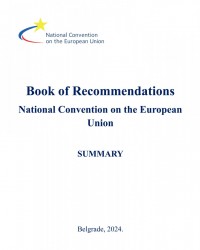 NCEU Book of Recommendations 2024 (Summary)
NCEU Book of Recommendations 2024 (Summary)
 National reports on collective bargaining in Serbia - CEECAW
National reports on collective bargaining in Serbia - CEECAW
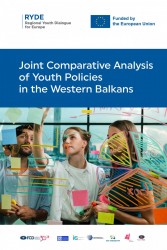 The Comparative Analysis of Youth Policies in the Western Balkans (WB)
The Comparative Analysis of Youth Policies in the Western Balkans (WB)
 Unlocking Collective Bargaining Power in Three Sectors: A Call to Action
Unlocking Collective Bargaining Power in Three Sectors: A Call to Action
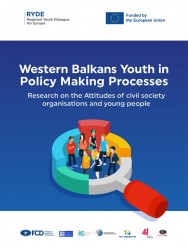 Western Balkans Youth in Policy Making Processes
Western Balkans Youth in Policy Making Processes
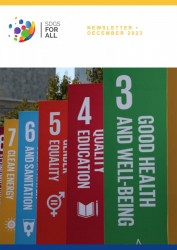 SDGs for All Platform newsletter (December 2023)
SDGs for All Platform newsletter (December 2023)
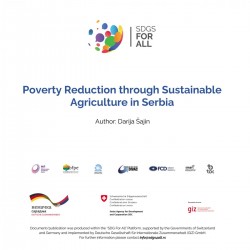 Analysis: Poverty Reduction Through Sustainable Agriculture in Serbia (with Summary)
Analysis: Poverty Reduction Through Sustainable Agriculture in Serbia (with Summary)


